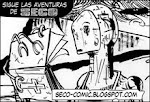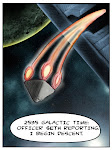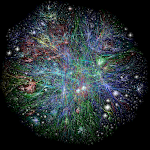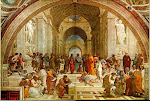Last class in L&C III we attempted a contrast between Daniel Defoe and Jonathan Swift, taking into account the particular insertion each author achieved in their social, literary and political context. We agreed that Swift’s relationship with early 18th-century British society seemed more problematic than Defoe’s. We explored the acrid sense of failure and disappointment that signed Swift’s life, and the unresolved contradictions of his spirit. But -we noticed- even if we put aside the biographical data and only focused on the author’s literary production, it could be also possible to perceive the degree to which his mind seemed fit for his society. And the same seemed to apply to Defoe.
 We noticed that Defoe’s social criticism was mainly oriented towards the fulfillment of Christian religious principles. Robinson Crusoe or Moll Flanders could function as examples of how social disruptions and personal flaws can be amended by commitment to religious values and rules. Even his caustic The Shortest Way with the Dissenters, which sent him to the pillory, was mainly a religious satire (although with deep political implications).
We noticed that Defoe’s social criticism was mainly oriented towards the fulfillment of Christian religious principles. Robinson Crusoe or Moll Flanders could function as examples of how social disruptions and personal flaws can be amended by commitment to religious values and rules. Even his caustic The Shortest Way with the Dissenters, which sent him to the pillory, was mainly a religious satire (although with deep political implications).
Swift never got to the pillory, but still his clash with society went far beyond a mere religious stance. Swift’s criticism seems to have been directed against society as a whole. Gulliver’s Travels, his incontestable masterpiece, is a minute and comprehensive dissection of Western culture and an attack against everything that is dear to the English (and European) mind, its most salient object of scorn being humanity itself.
Perhaps, it is possible to understand this contrast between Defoe and Swift as originated in a definitely opposed conception of humanity. Defoe looks backwards, to the mythical origin of humanity, when man is still the image of the divinity, and he consequently strives for the recuperation of that original (Christian) man. Contrariwise, Swift looks forward. For Swift, there seems to be no mythical past. Humanity does not appear seriously linked to any divinity, but it is, instead, the mirror of the revolting Yahoos, the trifling Lilliputians, the insubstantial Laputians, or the useless projectors in Lagado. Rather than spiritual in essence, Swift’s man is seen in his utter animality. This is present in Gulliver’s horrified depiction of the Brobdingnagians, but also in Swift’s revealing treatment of bodily functions, of which The Lady’s Dressing-room is perhaps the most enlightening example. In Swift, it is possible to infer, humanity is not really ‘human,’ but still animal.
Thus, Swift’s ideal of humanity seems to be placed at the end of a forward movement from animality (the present) to a purified, improved ‘humanity’ (not yet achieved -and perhaps, even unattainable) [1]. Clearly, the means for this purification is reason. In fact, if there is one thing that all of Swift’s writings seem to condemn, that is irrationality, even under the disguise of rational and scientific thought. Accordingly, the Master Houyhnhnm reproves Gulliver’s depiction of the atrocities of war: “He seemed therefore confident,” Gulliver retells, “that, instead of reason we were only possessed of some quality fitted to increase our natural vices; as the reflection from a troubled stream returns the image of an ill shapen body, not only larger but more distorted.”
Hopelessly aware of this reality, Gulliver feels as an exiled in his own nation. He does not fit. Crusoe or Moll Flanders, on the contrary, are triumphantly welcome by their formerly adverse societies. Swift’s and Defoe’s creations can help us bring light on how the authors’ minds were suited to their own time. While Defoe’s characters manage to find their place in the world, Swift’s heroes and situations are in a constant state of clash and tension. Where Defoe’s works find a path towards light and hope, Swift’s, on the contrary, show a flawed, irreparable world. Where Defoe sees redemption, Swift understands condemnation; where Defoe sees humanity, Swift can only perceive a damned, debased, futile race.
[1] It is possible to perceive in this argumentation a somewhat implicit, precarious Darwinist conception of humanity. Mankind would be no more than sophisticated and evolved animals. Just as the Yahoos look like degenerated human beings.

This text by Simud is licensed under a Creative Commons Attribution-No Derivative Works 3.0 United States License.
Permissions beyond the scope of this license may be available at this contact.
















.gif)






